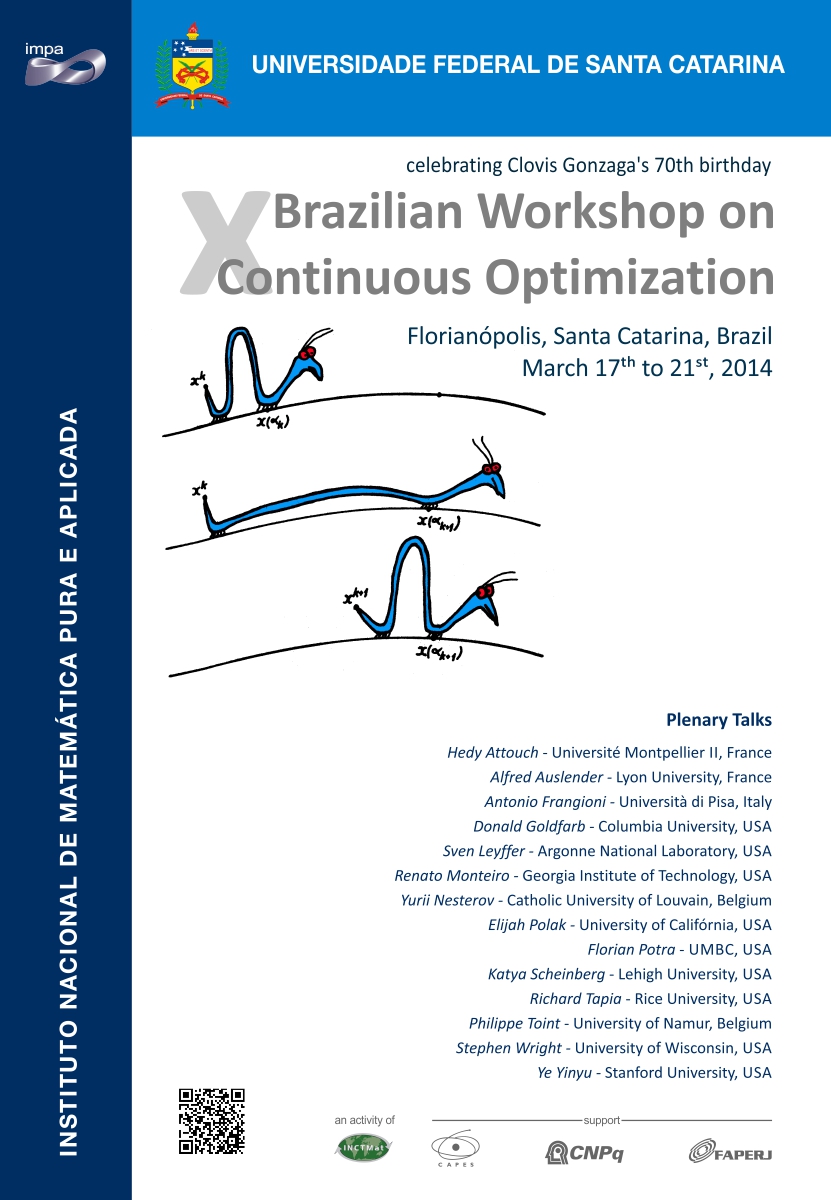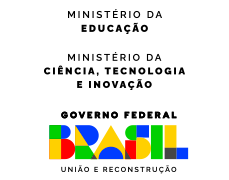X Brazilian Workshop on Continuous Optimization
Celebrating
Clovis Gonzaga’s 70th birthday
Florianópolis, Santa Catarina, de 17/03 até 21/03, 2014 
Certificates
Contributed Talks
Jorge Amaya, Centro de Modelamiento Matematico, Univ. de Chile
The Mine Planning Problem: from the Discrete to the Continuous Framework
Roberto Andreani, IMECC
On the behaviour of constrained optimization methods when Lagrange multipliers do not exist
Luis Felipe Bueno, Univ. Federal de São Paulo
An affordable general-purpose Inexact Restoration method
Orestes Martín Bueno Tangoa, Instituto de Matemática y Ciencias Afines
Equivalence between the p-cyclic quasimonotonicity and the p-cyclic monotonicity for affine maps
Esdras Penêdo de Carvalho, Universidade Estadual de Maringá
Fitting Supercritical Fluid Extraction Models by means of a Derivative-free Software
Romulo Castillo, UFPR
An unified approach to multiplier and proximal methods
Rafael Correa, Universidad de Chile – Matematica
Characterizations of convex approximate subdifferential calculus in Banach spaces
Marcelo Marcel Cordova, UFSC
Assessing numerical performance of some nonsmooth optimization methods in solving thermal unit-commitment problems
Luis Mauricio Graña Drummond, UFRJ
An external penalty method for multictriteria
Jonathan Eckstein, Rutgers University
Multilevel optimization modeling for stochastic programming with coherent risk measures
Rodrigo Garcia Eustaquio, Universidade Tecnológica Federal do Paraná
A new class of root-finding methods in $R^n$:The Inexact Chebyshev-Halley tensor free class
Marcia Helena Costa Fampa, UFRJ
Globally solving non-convex problems with indefinite quadratic functions
Orizon Pereira Ferreira, UFGO
On the local convergence of Newton’s method to function with values in a cone under majorant condition
Mituhiro Fukuda, Tokyo Institute of Technology
Nonmonotone spectral projected gradient method variant for semidefinite optimization problem with log-determinant and l_1 norm terms
Damián Fernández , Universidad Nacional de Córdoba
Some properties of the CPLD constraint qualification
Yboon Victoria García Ramos, Instituto de Matemática y Ciencias Afines
Integration Formulas without convexity
John Lenon Cardoso Gardenghi, Instituto de Matemática e Estatística
Interior-point line search methods for linearly constrained optmization
Justina Gianatti , Universidad Nacional de Rosario
Solving a Min-Max Control Problem via an Associated Discrete Problem
Max Leandro Nobre Gonçalves, UFGO
Convergence of the Gauss-Newton method for a special class of systems of equations under a majorant condition
Geovani Nunes Grapiglia, UFPR
A Subspace Version of the ARC Algorithm for Unconstrained Optimization
Lutz Gross, School of Earth Sciences, The University of Queensland -St Lucia, Australia
PDE- Constraint Optimization for Large-Scale Inversion of Geophysical Data
Vincent Guigues, FGV
Risk-averse mirror descent for convex and uniformly convex stochastic programs with applications to hypotheses testing of risk measures
Gabriel Haeser ( Universidade Federal de São Paulo)
A flexible inexact restoration method and application to multiobjective constrained optimization
Flavia Morgana de Oliveira Jacinto, UFAM
Some conditions for maximal monotonicity of bifunctions
Joaquim João Júdice, Univ. de Coimbra
On the Quadratic Eigenvalue Complementarity Problem
Bruno Figueira Lourenço , Tokyo Institute of Technology
Weak Infeasibility in Semidefinite Programming
Juan Pablo C. Luna , IMPA
An Approximation Scheme for a Class of Generalized Nash Equilibrium Problems with Risk Aversion
Luiz Matioli, UFPR
Algorithms for the Nash Equilibrium Problems
Tiara Martini, IMECC
Solving feasibility problems with complementarity
Jefferson Melo , UFGO
Some Results About a Modified Subgradient Algorithm
Robert Mifflin, Washington State University
V-models for nonconvex minimization: A prerequsite for a VU-algorithm
Pedro Munari,UFSCar
Interior point method and column generation for solving large-scale optimization problems
Valeriano Antunes de Oliveira, UNESP, S. J. do Rio Preto
Description of Attainable Sets of Differential Inclusions through Optimal Control
Welington Luis de Oliveira, IMPA
Nosmooth optimization methods for chance constrained programming
Lucas Garcia Pedroso, UFPR
Derivative-free trust-region algorithms for constrained minimization
Luis Roman Lucambio Perez, UFGO
On the existence of sub-differentials
Renan Vicente Pinto, UFRJ
The Problem of Covering Solids By Spheres of Different Radii
Jose Alberto Ramos Flor, IMPA
Constraint qualifications and approximate-KKT sequences
Daniel Reem, USP S. Carlos
Zero-Convex Functions, Perturbation Resilience, and Subgradient Projections for Feasibility-Seeking Methods
Ademir Alves Ribeiro, UFPR (UFPR)
Theoretical aspects of adopting exact penalty elements within sequential methods for nonlinear programming
Jan-J. Ruckmann, Univ. of Bergen
Max-Type Objective Functions: A Smoothing Procedure and Strongly Stable Stationary Points
Maria Daniela Sanchez, Universidad Nac. de la Plata
An exponential augmented Lagrangian method with second order convergence
Sandra Augusta Santos, IMECC- UNICAMP
Algebraic rules for quadratic regularization of Newton’s method
Hugo Scolnik , Univ. de Buenos Aires
Inproving robustness of the L-BFGS for Large Scale Nonlinear Optimization.
Mauricio R. Sicre (UFBA)
A hybrid proximal extragradient self-concordant primal barrier method for monotone variational inequalities
Paulo José da Silva e Silva, IMECC
The Spectral Cauchy-Akaike Method
Roberto Cristovao Mesquita Silva, UFAM
An inexact and nonmonotone proximal method for smooth unconstrained minimization
Pedro Antônio Soares Júnior, UESPI
A proximal point method with generalized distances for a class of bilevel equilibrium problems
Wilfredo Sosa Sandoval, UCBsb
Equilibrium via equilibrium
Graciela Sottosanto, Univ. Nac. del Comahue
On the Saddle Point Problem for Differentiable Multiobjective Optimization and Generalized Notions of Convexity
Lucas Eduardo Azevedo Simões , IMECC – UNICAMP
On the Nonmonotone Line Search in Gradient Sampling Methods for Nonconvex and Nonsmooth Optimization
Abel Soares Siqueira, IMECC – UNICAMP
Dynamic Control of Infeasibility for Nonlinear Programming
Michel Thera, Universite Limoges
Estimate for fixed points of composition of multifunctions and application to the global version of the Lusternik-Graves Theorem
Cristina Vilma Turner, Univ. Nac. de Cordoba
Adjoint method for a tumor invasion PDE-constrained optimization problem
Uriel Octavio Moreles Vazquez, Instituto Politecnico Nacional
Continuous Numerical Solution of a Differential Equation
Deadlines
Abstract and Poster Submission – not later than December 31th, 2013.
Financial Support – Applications must be submitted until February 17th, 2014
Registration Fee – Payments with discount until January, 15, 2014.
Financial Support
Financial Support: The workshop has a limited number of grants to cover local expenses of students and young researchers.
Applications must be submitted until February 17th, and the result will be released on February 27th. All applicants must register at the workshop’s homepage.
Students must also submit a short curriculum vitae and a recommendation letter from the advisor or equivalent. The letter must be sent directly by the recommender
to eventos@impa.br or xbrazopt@gmail.com, with subject line “X BRAZOPT – support”.
Financial support will be given just to students and Young researchers that will make a presentation during the workshop.
Organizing Committee
Alfredo Iusem (IMPA)
Clóvis Caesar Gonzaga (UFSC)
Ademir Alves Ribeiro (UFPR)
Elizabeth Wegner Karas (UFPR)
Juliano de Bem Francisco (UFSC)
Luiz Carlos Matioli (UFPR)
Maicon Marques Alves (UFSC)
Melissa Weber Mendonça (UFSC)
Rafael Casali (UFSC)
Plenary Talks
Kurt M. Anstreicher – (University of Iowa)
An Approach to the Dodecahedral Conjecture Based on Bounds for Spherical Codes
Antonio Frangioni – (Università di Pisa, Italy)
Reformulations for Mixed-Integer Nonlinear Programs: a surprisingly simple one with surprisingly good results in a few different applications
Benar Fux Svaiter – (IMPA)
A survey on Descent Method in Multiobjective optimization
Clovis Gonzaga – (UFSC)
On the complexity of the steepest descent algorithm for minimizing convex quadratic functions
Alfredo Iusem – (IMPA)
Order preserving and order reversing operators on the class of convex functions in Banach spaces
Sven Leyffer – (Argonne National Laboratory, USA )
Recent Advances in Mixed-Integer Nonlinear Optimization
Renato Monteiro – (Georgia Institute of Technology, USA)
Accelerating block-decomposition first-order methods for solving generalized saddle-point and Nash equilibrium problems
Yurii Nesterov – (Catholic University of Louvain, Belgium)
Universal gradient methods
Michael Overton – (New York University)
Narrowing the Difficulty Gap for the Celis-Dennis-Tapia Problem
Claudia Sagastizabal – (IMPA)
Structured Nonsmooth Optimization for Problems Arising in the Finance and Energy sectors
Katya Scheinberg – (Lehigh University, USA)
Practical Inexact Proximal Quasi-Newton Method with Global Complexity Analysis
Mikhail Solodov – (IMPA)
Globalizing stabilized SQP by smooth primal-dual exact penalty function
Takashi Tsuchiya – (Japan – National Graduate Research Institute for Policy Studies )
Geometric Approaches to Interior-Point Methods
Philippe Toint – (University of Namur, Belgium)
Evaluation Complexity in Nonlinear Optimization Using Lispschitz-Continuous Hessians
Stephen Wright – (University of Wisconsin, USA)
Asynchronous Parallel Optimization Methods.
Poster Session
Instructions for Poster Presentation
Due to the size of the poster boards your poster may not exceed 90 cm in width and 120 cm in height (portrait format). Materials for mounting the posters will be available at the poster areas.
Local organizers will provide the necessary materials for the setup, but please remember that there will be no possibility to print out the posters at the conference site.
Posters will have to be mounted between 08:00 and 08:30 in the morning and will have to be removed after 18:00 in the evening. During the poster viewing period the presenting author and/or co-authors are asked to be present at the poster in order to be available for questions and discussions.
The title and Author(s) Name(s) must appear on the top of the final poster. The poster should have a balance between the text and illustrations. The illustrations should have a bigger area of the poster. Font size should be large enough to enable reading from a certain distance. It is suggested the following font size:
- Title: Size 70 (1,5cm H)
- Author(s) Name(s): Size 50 (1cm H)
- Text: Size 28 (0,7cm H)
Authors and Poster Titles
F. R. B. Cruz, UFMG
User Equilibrium Routes in Finite State-Dependent Queueing Networks
Leonardo Moreto Elias, UFPR
A theorical basis for lower semi-continuous functions’s conjugation
Priscila Savulski Ferreira, UFPR
Derivative-free optimization: A globally convergent algorithm for unconstrained problems
Oliver Kolossoski, UFPR
A Quasi-Newton Method for Solving a Spheres Intersection Problem
Tibério Bittencourt de Oliveira Martins, UFGO
Local convergence analysis of Inexact Newton method with relative residual error tolerance under majorant condition in Riemannian Manifolds
Marco Antonio Figueiredo Menezes, PUC – Goiás
A Gonzaga’s Problem
Reinier Díaz Millán, Instituto Federal de Educação, Ciência e Tecnologia de Goiâs
A variant of forward-backward splitting method for the sum of two maximal monotone operators with a new search strategy
Tiago de Morais Montanher, IME-USP
Global estimation of hidden Markov model parameters via interval arithmetic
Marluce da Cruz Scarabello, INPE
The q-CG Method Applied to the Wave Annihilation Problem
Raniere Gaia Costa da Silva, IMECC
perprof-py — A Python Package for Performance Profile
Daniella Porto,UNESP- S.J.Rio Preto
Approximation to impulsive optimal control problems using the Euler’s discretization
Augusto Sousa da Silva Filho, CEFET-MG
Using a Computerized Adaptive Test for optimizing questionnaires – Application of Item Response Theory
Adriano Verdério, Universidade Federal de Santa Catarina – Campus Joinville
A trust-region method with models based in support vector machines regression
Programs
Contributed Sessions
– Monday, Tuesday and Thursday Afternoons
Registration
English
| Category | Payment Up To January, 15, 2014 | Payment After January 15, 2014 |
| Students (MSc and Ph.D) | US$ 50.00 | US$ 75.00 |
| Foreign Participants | US$ 250.00 | US$ 300.00 |
| Latin American Researchers | US$ 125.00 | US$ 150.00 |
Portuguese
| Categoria | Pagamentos até 15 de janeiro, 2014 | Pagamentos depois de 15 de janeiro, 2014 |
| Estudantes | R$ 100,00 | R$ 150,00 |
| Pesquisadores Estrangeiros | US$250,00 | US$300,00 |
| Pesquisadores Latino Americanos | R$ 250,00 | R$ 300,00 |
Pagamento da taxa de inscrição SOMENTE para brasileiros através de: transferência ou depósito identificado (nome do participante inscrito) ou o envio escaniado (e-mail: xbrazopt at gmail.com) do comprovante para ser lançado no registro do evento.
Banco do Brasil
Agência:0598-3
CC: 37.938-7
CEMAT
Registered Participants
Scientific Committee
Alfredo Iusem (IMPA)
Benar Svaiter (IMPA)
Mikhail Solodov (IMPA)
Claudia Sagastizábal (CEPEL)
Clóvis Caesar Gonzaga (UFSC)
José Mario Martínez (UNICAMP)
Susana Scheimberg (UFRJ)
Yuan Jin Yun (UFPR)
Social Events
On Wednesday there are no talks. Instead, we are organizing a boat tour to Anhatomirim island:
http://www.guiafloripa.com.br/english/tourism/islands/ianhatomirim.php3
The excursion price is R$ 80 per person, including lunch; and must be paid before 9am of Tuesday, March 18.
For paying the fee and more information on departure and arrival times, please contact the workshop registration desk in the hotel.
Venue: Hotel Jurerê
Postal Address: Instituto Nacional de Matemática Pura e Aplicada
Estrada Dona Castorina 110, Jardim Botânico
Rio de Janeiro, RJ, CEP 22460-320, Brasil
E-mail: eventos@impa.br & xbrazopt@gmail.com


